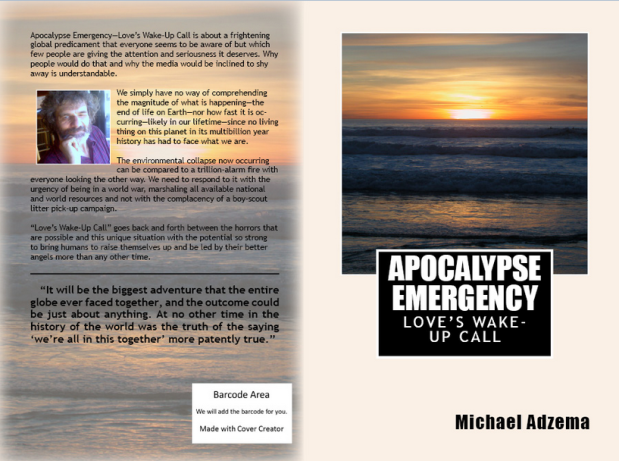“One is often blocked from the immediate satisfaction of needs, that is true; and that applies to all planetmates, including humans. Being frustrated from satisfaction is one of those exigencies of life and fate which teaches us. What makes you different is your self-denial when there is no need for it. Again you have taken over the determination of your spiritual path. Again you show how you defy the Divine by seeking to control It (just as you sought to control your caregivers as babies), instead of learn from It. Rooted in your infancy and the inadequate and capricious qualities of your care and need satisfaction then, you seek afterward to deny yourself, again, in an unconscious way of seeking divine reward. Your denial, suffering, praying, and self-flagellation — figurative and literal — are ways you seek to bring forth advantage later … they are sad and distant reflections of your baby attempts to influence the Great Mom.
“Hierarchy of Needs
“And they are not just pathetic; they are ineffectual. For it is not in the non-satisfaction of one’s needs that one rises up in life. It is the satisfaction of needs that allows one to go beyond them to higher concerns and “needs.” When one has satisfied one’s needs for food and water, one’s mind and body naturally orient themselves toward the satisfaction of needs and desires for connection and intimacy with others … in community, family, and one-to-one personal and love relations. When one is contented in interaction with community, family, and intimate others, one naturally is drawn to the satisfaction of creative and spiritual urges.
“Certainly one can attempt to pursue relational, creative, and spiritual ends when one is in dire need, and one can, with effort, achieve results. But the product of those endeavors is skewed and diminished by the fact that the entirety of one’s being is not directed toward those ends as — whether one knows it or not, whether it is a conscious or unconscious thing — one’s body and the attendant parts of one’s mind are busy deflecting bodily urges at the same time. One “rises up” not by cutting oneself off from one’s body but by standing solidly upon it.
“So, one’s achievements while in a state of deprivation or distraction are distorted and sometimes counterproductive. For this path of detachment from one’s body and its needs does not lead to spiritual wholeness and connection. Rather, its result is an emotionless, self-obsessed, compassion-less, humorless, and empty state of consciousness and being … cut off from one’s body … which is labeled “transcendent” … but which is simply split from Reality, Nature, God, and Divinity, and which is solitary and supremely defended … and lonely.
“No, one does not transcend body and Nature and become one with God. For God/Divinity is in Nature/Reality. One can rise above body and call it spiritual, but it is simply human Ego that one has glorified. And the God that one worships in doing that is not one that you are made in the image of, it is one that is made in the image of you … with all your faults, narcissism, vanity, cruelties and insensitivities, false accomplishments, and vain adornments.
“So, in humans alone, non-expression of needs would be part of the communication devices developed by your young to achieve (secretly or unconsciously) the satisfaction of those needs. And repression of needs — that is, the attempt, consciously at first, later unconsciously, to not feel them — became a survival skill in relation to humans in your social world, however much of a disadvantage it is in relation to your biological survival, per se, or in relation to your world of Nature. You might repress your needs and get cancer … but they would like you!
“Individual decisions to adopt these ways are not done intentionally, of course. Being required for survival it became part of your set of species traits. Furthermore, developed in infancy, it would result in your species having the only politicians and sales people.
“And it should be clear how well these fit in with and how much more they were reinforced in the sedentary societies with the hierarchical social structures, where non-expression of needs — denial of self, feeling, and personhood — were desired by higher ups in order to support their illusion that their controlling tendencies were of no real harm or consequence to any others: Acting less human and real helped higher ups in their illusion that you were … less feeling and real! Being tough and unfeeling told them, not just that you were manipulatable … for you would take whatever they dished out, but even that you were needing and desiring direction and controlling from them. The more you acted like a robot, the more they felt you were unconscious and unfeeling and needed their help. The more you acted infantile and unthinking, they more they felt you needed their direction and paternalism, lest you die or kill yourselves all off.
“So, these things in infancy contributed to the ability of some of you to enslave others and to make all of you slaves — in ways profound and different from the rest of Nature — in your minds….”
— excerpted from *Planetmates: The Great Reveal* by Michael Adzema … now available in print and e-book formats at Amazon
ABOUT THE AUTHOR, Michael Adzema. Video below … interviewed by Michael Harrell
.
https://www.youtube-nocookie.com/embed/2mm9OBbYjRE
.
.
— Related: See also other published versions of these ideas….
.
*Dance of the Seven Veils I* (2017).
At Amazon at
*The Secret Life of Stones: Matter, Divinity, and the Path of Ecstasy* (2016).
*Falls from Grace: The Devolution and Revolution of Consciousness* (2014).
*Apocalypse NO: Apocalypse or Earth Rebirth and the Emerging Perinatal Unconscious* (2013).
,
*Culture War, Class War: Occupy Generations and the Rise and Fall of “Obvious Truths”* (2013).
.
Invite you to join me on Twitter: http://twitter.com/sillymickel
friend me on Facebook: https://www.facebook.com/sillymickel













